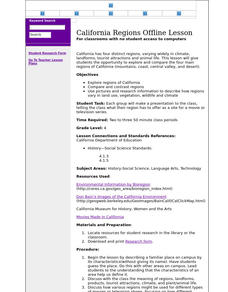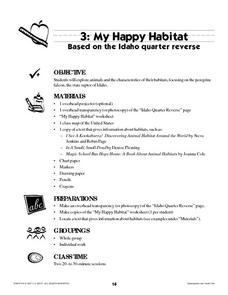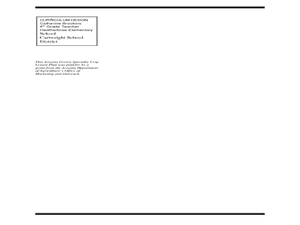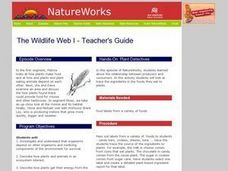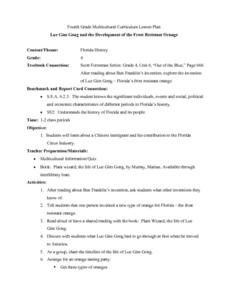Curated OER
California Regions
Students explore and compare and contrast the four main regions of California: mountains, coast, central valley, and desert. students use pictures and research to describe how regions vary in land use, vegetation, wildlife and climate.
Curated OER
Classification Schemes
Students place organisms into the correct classification and justify their reasoning. They must include all objects and have a reason for their decisions.
Curated OER
Bug Time
Pupils identify basic pest they find in the school yard. They discover and examine pest control. They also explain the benefits and risks of pests. High school students present a short lesson to third graders.
Curated OER
Hairy Monster Stories
Students work together to create a hairy monster. They discuss the elements of a character sketch. They use a rubric to guide them as they write a sketch of their hairy monster.
Curated OER
Whose Parts Do I Have? (Wings and Things)
Students identify an animal and a body part and then matches a body part to a specific animal. This will assess their ability to sort organisms and objects into groups according to their parts and describe how the groups are formed and...
Curated OER
Habitat Lap Sit
Learners examine through role play interdependence of animal and man in their search for the proper arrangement of food, water, shelter and space in the same regions. Students then discuss necessary components of suitable habitat.
Curated OER
My Happy Habitat
Young scholars observe and discuss the Idaho state quarter to begin an activity in which they define and draw different types of habitats. They discuss the habitats that the migrating Peregrine falcon, which appears on the Idaho...
Curated OER
California Biodiversity
Students examine several maps of California exhibiting features such as precipitation, topography, and vegetation. They look for patterns that might be the source of or influence biodiversity in different regions. They pay particular...
Curated OER
Great Salt Lake
Fourth graders make an ecosystem that brine shrimp can live in and take data as to what level of salinity the water is, how cold it is, and other data that students may think is important. They also hypothesize and predict the outcomes...
Curated OER
I Spy
Second graders play the game I Spy to help identify objects made from rock. They investigate the properties and uses of rocks and go on an I Spy search on the playground. They sort pictures according to living and nonliving objects.
Curated OER
What Does Life Look Like Under a Microscope?
Learners discover cells make up all living things. In this life science lesson, students investigate living organisms and the cells that create them. Finally the learners create a testable question, conduct an investigation, and draw...
Curated OER
Welcome to the Sahara Desert
Students explore their artistic skills. In this Sahara Desert lesson, students use the Internet to research the Sahara and paint a watercolor picture depicting the desert.
Curated OER
Something's Fishy
Learners study fish habits and traits. In this marine life lesson, students complete four learning centers of a fish memory game, a fish habitat study, draw and glue fish craft activity, and a fish read-a-thon. Learners complete their...
Curated OER
Rocks and Minerals: Sedimentary Rocks
Learners explore the concept of rock formation. In this sedimentary rocks lesson plan, students observe and record their findings about sedimentary rocks. Learners then create limestone, coal, and sandstone models and write reports...
Curated OER
Let's Make Stew!
Students investigate how to create a vegetable garden and complete related activities. In this vegetable garden lesson, students receive agriculture notebooks to complete vocabulary for the gardening lesson. Students read 'Still-Life...
Curated OER
Relationships and Biodiversity
Students examine diversity on the planet and the differences within a species. In this investigative lesson students complete a lab that allows students to better understand the relatedness between plants.
Curated OER
This Is Tree-rific!
Third graders view a clip of the video Backyard Safari, "Trees," and portray the life cycle of a tree. They also view a clip on structures of a tree and draw a diagram of a tree in their science journals.
Curated OER
Does a change in pH affect the growth and survival rate of aquatic plants?
Learners determine if changes in pH affect the growth and survival rates of aquatic plants. They evaluate the optimal pH levels for the growth of aquatic plants.
Curated OER
Weedy Socks & Wheels
Learners engage in a instructional activity that is concerned with the concept of using socks in order to collect weed seeds. They conduct research in order to illustrate the ease of how weeds are spread from one area to another....
Curated OER
The Wildlife Web I
Students explore the relationship between producers and consumers. In this activity, they trace the ingredients in the foods they eat to plants. Supplement to Natureworks episode from New Hampshire Public Television, but activities may...
Curated OER
DOES A FLUCTUATION IN TEMPERATURE IFFECT THE GROWTH AND SURVIVAL RATE OF AQUATIC PLANTS?
Students determine if different temperatures effect the growth and survival rates of aquatic plants and evaluate the optimal temperature for the growth of aquatic plants.
Curated OER
Relationships and Biodiversity Lab Practice
In this biodiversity activity, high schoolers determine the relationship and complete the evolutionary tree for the plants listed. Students review genetic code and DNA sequencing. This activity has 1 graphic organizer, 8 multiple choice,...
Curated OER
Learning from Artifacts Uncovering Clues, Large and Small
Students observe artifacts from Fort St. Louis at a website in order to make inferences about the people who lived there. They paint pottery in the style which might have been used by one of the cultural groups who inhabited the fort.
Curated OER
Lue Gim Gong and the Development of the Frost Resistant Orange
Fourth graders read about Ben Franklin's invention and talk about other inventions they have heard about. They listen to the book about Lue Gim Gong and discuss what he had to go through at first when he came to America and chart the...


